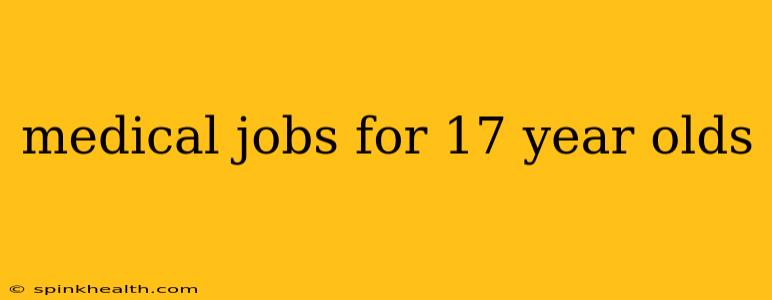The world of medicine is vast and exciting, offering a multitude of pathways for those with a passion for helping others. Even at 17, you can start gaining valuable experience and building a strong foundation for a future healthcare career. While you might not be able to perform complex medical procedures, there are plenty of entry-level medical jobs available for teenagers. This journey begins with exploring your options and understanding the legal and practical considerations.
What Medical Jobs Can I Get at 17?
This is the burning question, right? The good news is there are more options than you might think! Let's explore some possibilities. Many roles don't require extensive medical training but benefit from a caring attitude, reliability, and a willingness to learn.
Certified Nursing Assistant (CNA) (Often Requires 18+):
While many CNA programs require applicants to be at least 18, some states might have exceptions or offer pathways for younger individuals with special permission or apprenticeships. It's crucial to check your state's regulations and explore local community colleges or vocational schools.
Medical Receptionist/Administrative Assistant:
Many clinics and hospitals hire young adults for receptionist roles. These jobs involve answering phones, scheduling appointments, greeting patients, and handling administrative tasks. Strong communication and organizational skills are key here.
Home Health Aide:
Similar to CNAs, the age requirement for HHAs can vary by state. This role often involves assisting elderly or disabled individuals with daily tasks like bathing, dressing, and meal preparation. Compassion and patience are essential.
Medical Scribe:
Some physicians' offices employ medical scribes who record patient information, document visits, and assist with medical record-keeping. These roles often require strong typing and note-taking skills.
Phlebotomy Technician (Potentially with Restrictions):
Some phlebotomy training programs might accept 17-year-olds, but this often depends on state regulations and the specific institution. This role involves drawing blood samples from patients, requiring precision and a steady hand.
Emergency Medical Responder (EMR):
While often requiring certification, some jurisdictions might allow 17-year-olds to participate in EMR programs or volunteer with emergency services under supervision. This path provides invaluable experience and a chance to make a direct impact.
What are the Legal Restrictions on Medical Jobs for 17-Year-Olds?
The biggest obstacle is often the age of majority. Most healthcare roles require individuals to be 18 or older due to legal and liability concerns. However, some exceptions exist, often with parental consent or through specific training programs. It’s essential to research your state's child labor laws and the specific requirements of each potential employer.
How Can I Find Medical Jobs Suitable for My Age?
Your search strategy should involve:
- Local Hospitals and Clinics: Check their websites for job postings or inquire directly about volunteer opportunities or entry-level positions.
- Online Job Boards: Websites like Indeed, LinkedIn, and Monster sometimes list entry-level healthcare roles. Be sure to filter by location and specify your age restrictions.
- Vocational Schools and Community Colleges: These institutions often offer training programs for healthcare careers and may have connections with employers seeking young talent.
- Networking: Talking to friends, family, and your school's guidance counselor might lead to unexpected opportunities.
What Skills and Qualities Are Essential for Medical Jobs at 17?
Beyond specific job requirements, several qualities are valuable across different medical roles:
- Compassion and Empathy: Genuine care for others is essential in any healthcare setting.
- Strong Work Ethic: Reliability and punctuality are highly valued.
- Communication Skills: You'll need to interact effectively with patients, colleagues, and supervisors.
- Attention to Detail: Accuracy and precision are crucial, especially in roles involving data entry or patient care.
- Teamwork: Healthcare is a collaborative field, so the ability to work effectively as part of a team is essential.
Can I Volunteer in a Medical Setting at 17?
Volunteering offers a fantastic way to gain experience and explore different areas of healthcare. Hospitals, clinics, and nursing homes frequently accept volunteers, even at younger ages. Volunteering allows you to learn about the day-to-day operations of a healthcare setting and build valuable skills.
Your journey into the medical field begins with research, exploration, and a proactive approach. While limitations exist, several avenues are open to 17-year-olds eager to start their healthcare careers. Remember to check local regulations, carefully review job descriptions, and highlight your skills and enthusiasm in your applications. Good luck on your path to becoming a healthcare professional!

